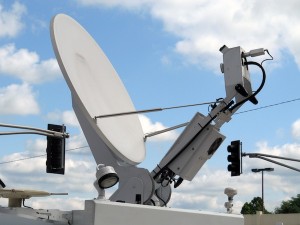Hosting a Simulcast
 Over the past few years, our church has hosted several simulcast events and we’ve learned what works well and we’ve also learned what not to do. We’ve hosted internet simulcasts with Beth Moore, Dave Ramsey, and Priscila Shirer, and we’ve hosted satellite simulcasts using the now defunct CCN.tv satellite service. Last week, we were able to offer our help with a local simulcast of the Chick-fil-A Leadercast. Here are a few things we have learned.
Over the past few years, our church has hosted several simulcast events and we’ve learned what works well and we’ve also learned what not to do. We’ve hosted internet simulcasts with Beth Moore, Dave Ramsey, and Priscila Shirer, and we’ve hosted satellite simulcasts using the now defunct CCN.tv satellite service. Last week, we were able to offer our help with a local simulcast of the Chick-fil-A Leadercast. Here are a few things we have learned.
Take Advantage of the Testing Times
Multiple testing times have been made available for each simulcast we have hosted. Don’t overlook these times. Their purpose is two-fold, it helps them make sure they have the back-end systems in place to handle the bandwidth requirements, and it helps you to make sure that your equipment is functioning properly. You also want to test with the exact same equipment that you will use on the day of the event. Eliminate as many variables as possible. For example, we always turn off our wireless internet access so we don’t have to worry about someone using all our bandwidth on their iPad or laptop.
For one of our satellite events, we had done all the testing and everything was working great, up until the day of the event. Someone at our church ran a Windows Update on the main projection computer that was feeding the projectors. So when it came time for the event to start, I immediately had a blue screen of death staring back at me. One of the updates had not installed properly and was causing the computer to crash with the video capture software. We had to do a system restore on the computer that took about 10 minutes to complete. So that leads to the next point …
Have a Backup Plan
Have a backup computer in place! Have a backup source for your internet. Have a backup projector. Try to think through everything that can go wrong and then come up with a plan for how to handle it. Another great idea is to have someone available that can jump up and speak to the audience in case of technical difficulties. If there is a problem, plan for group activities that everyone can participate in or have a DVD that you can play while the problems are fixed. And if you have problems, you better know how to …
Know How to Contact Support
Write down the phone numbers, emails, and any other ways to contact the simulcast provider in case of emergency. I think LifeWay does the best job with this. They have a livechat where you can interact with support during the event. You can quickly find out if other people are having any problems. Twitter is another great way to monitor what is happening with the other simulcast sites. Setup a twitter search with the event hashtag and keep a close eye on the updates.
During the recent Chick-fil-A Leadercast, we ran into some very significant problems with support. Our account was locked out 20 minutes before the start of the event, presumably because we had logged in from a 2nd test computer. When we called tech support, their number was disconnected due to the high call volume. The live-stream started late so we couldn’t tell if it was working until the event actually started with the first video. And they didn’t respond immediately to emails. In the end, it all worked out, but it made for a stressful time of trying to contact them via phone and email and find out what was happening. So that brings me to the last point …
Don’t Panic When You Have a Problem
Keep your cool. The audience will feed off of the attitude of the event organizers. If you are calm and collected during any technical difficulties, then they will be much more patient. During almost every single event we have hosted, there have been times when we have lost the signal. Sometimes, it’s only for a few seconds, and sometimes it has been for a period of several minutes. Don’t panic, find out what has happened and take the steps to fix the problem. Typically, the problems we have had have been caused by the event host having difficulties. When that happens, there is really nothing you can do except wait and pray.
For the Chick-fil-A Leadercast, we had numerous problems early in the event with the live stream pausing and buffering. Thankfully we were watching twitter and saw that it was a widespread problem. We stopped the stream for about 10 minutes while they worked out the problems on their end, and we were able to jump back in when things started working again. We had prize giveaways and activities planned, so most people didn’t mind that we had the problems. Chick-fil-A did the right thing by acknowledging they had problems (although they really downplayed how widespread the problems were) and they provided an online link to the videos to everyone who attended. They took responsibility and they provided a solution, which made the event a success even in light of the problems we faced.
For our church, we want to be a resource to our community. We have the technology capability to host events like these and we really believe strongly in building the Kingdom. So if there is any way we can help build up other churches and strengthen our community, then we want to take the lead in making that happen. Simulcasts are one way we can do just that.




